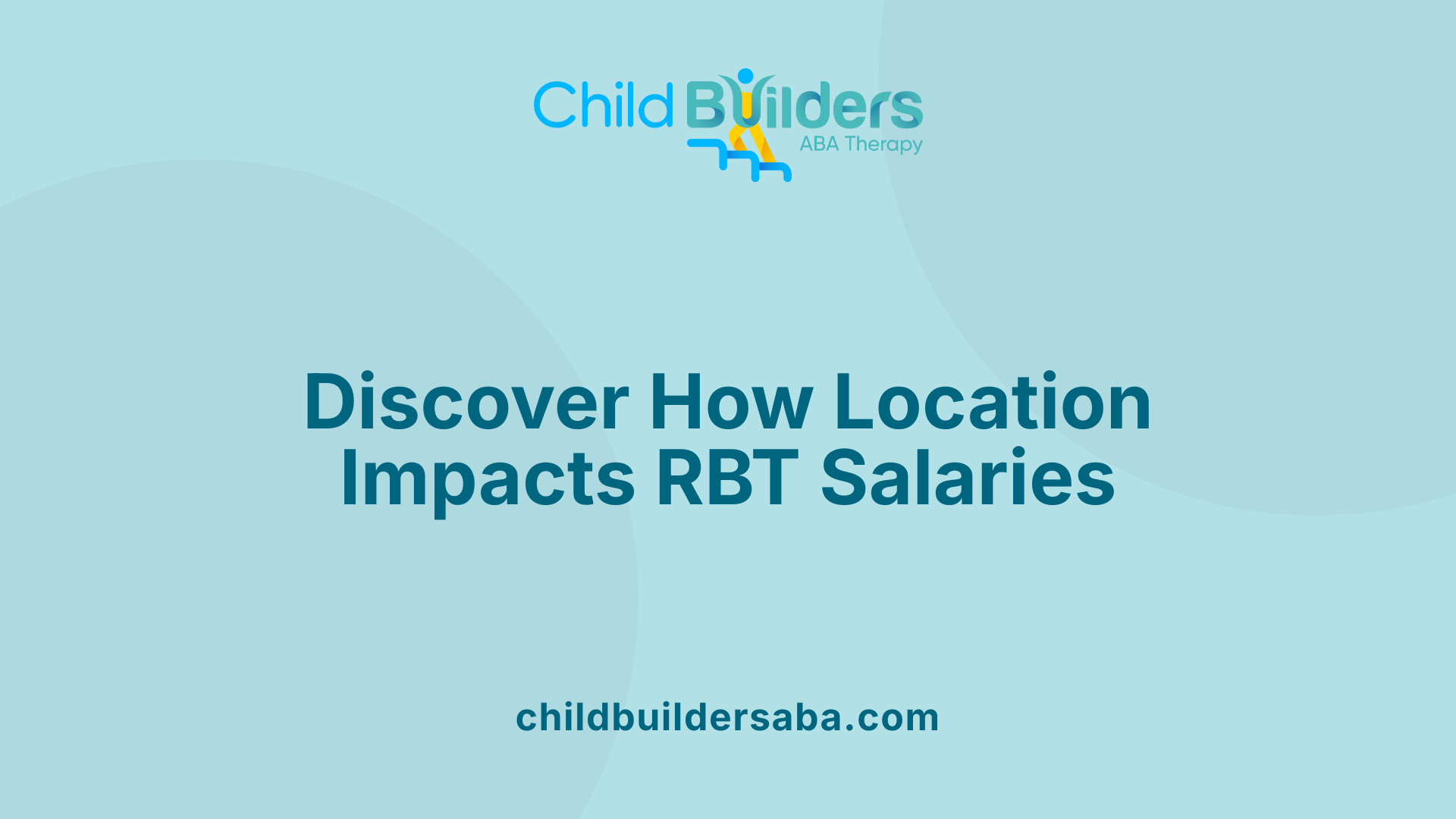Average Registered Behavior Technician (RBT) Salary

Understanding Compensation Trends for RBTs
Registered Behavior Technicians (RBTs) play a vital role in delivering Applied Behavior Analysis (ABA) therapies, especially in the growing field of developmental and behavioral health. As demand for ABA services surges, understanding the salary landscape for RBTs is essential for professionals considering entering or advancing within this field. This article explores the current income levels, factors influencing salaries, regional variations, career growth opportunities, and industry outlook.
Overview of the Average Salary for RBTs

What is the average salary of a Registered Behavior Technician (RBT)?
The salary of an RBT can vary widely based on factors such as experience, education, and location. On average, U.S. RBTs earn between $37,000 and $45,000 annually, with a national average around $39,520.
How do education and experience influence salary levels?
Entry-level RBTs with a bachelor’s degree typically earn from $32,000 to $43,000. With 5 to 10 years of experience, salaries increase to approximately $45,000 to $55,000. Those with over a decade of experience can see earnings from $50,000 up to $65,000 or higher.
Holding a master’s degree in behavior analysis boosts earning potential. Starting salaries for these professionals range from $45,500 to $60,000. After 5 years, wages can range from $50,000 to $60,000, and after 10 years, they might earn between $58,000 and $80,000.
Are there regional differences in RBT salaries?
Yes, geographic location significantly impacts pay rates. For example, Hawaii offers the highest regional average at about $54,222 per year. Other high-paying states include California ($47,980), Massachusetts ($46,140), and New York ($44,520).
In contrast, the lowest average salaries are found in North Carolina, around $29,760. Cost of living and demand for ABA services greatly influence these regional disparities.
How is the industry growing and affecting salaries?
The demand for RBTs is increasing rapidly, with projections of a 12% to 22% job growth over the next decade. This expansion is contributing to upward salary trends, especially as more professionals acquire advanced certifications or specialize in high-demand areas.
Overall, career advancement, additional certifications, and regional factors play critical roles in an RBT’s earning potential. Continuous industry growth promises further salary improvements in the coming years.
Salary Range and Factors Affecting Pay
What is the typical salary range for RBTs?
The standard salaries for Registered Behavior Technicians (RBTs) can fluctuate because of various influences such as experience level, education, and location. Entry-level RBTs usually start earning between $30,000 and $40,000 annually. The national average salary for RBTs is approximately $39,520 per year.
As RBTs gain experience, their earning potential increases significantly. Those with several years in the field, especially in states with higher costs of living, can earn over $50,000, with some reaching as high as $66,000 or more after ten or more years of work.
Geographically, salaries differ substantially. Hawaii, for example, offers the highest average pay at around $54,222 annually. Other lucrative states include California, Massachusetts, and New York, where salaries typically range from about $44,520 to nearly $48,000.
The demand for ABA services continues to grow, contributing to positive salary trends across the industry. This growth, coupled with advancing education and specialized certifications, makes the field promising for those seeking upward mobility.
How does experience influence salary growth?
Experience plays a crucial role in salary advancement for RBTs. Starting salaries at the entry level are often around $32,000 to $43,000, but with time and expertise, wages can increase to more than $66,000 annually. Particularly, after five to ten years, salaries tend to span from $45,000 to $55,000, and for ten years or more, salaries may reach between $50,000 and over $65,000.
Professionals with a master’s degree in behavior analysis typically see higher starting salaries, around $45,500 to $60,000, with further increases as they gain experience. With five years in the field, salaries for master’s degree holders generally range from $50,000 to $60,000, and after a decade, they can be between $58,000 and $80,000.
How does education and certification impact earning potential?
Higher education and specialized certifications contribute notably to salary prospects. RBTs with a master’s degree tend to earn more than those with a bachelor’s degree. On average, those with advanced qualifications can command starting salaries upwards of $45,000.
Further certifications, like becoming a Board Certified Behavior Analyst (BCBA), significantly enhance earning potential, with BCBAs earning around $65,000 or more. Specializing in high-demand areas or taking on supervisory roles also opens opportunities for higher wages.
How do employer type and industry setting influence pay?
Earnings can vary depending on the type of employer and industry setting. For instance, RBTs working in private clinics or high-cost urban areas tend to earn more than those in nonprofit organizations or rural settings.
Overall, the salary landscape for RBTs is positive, driven by expanding industry demand and increased educational pathways. Professionals who actively pursue further education, certification, and specialized roles are more likely to see increased earnings and job growth.
Regional Variations in RBT Salaries

Are there regional differences in RBT salaries?
Yes, RBT salaries vary notably across different regions in the United States. The national average salary hovers around $42,000, but this figure can change significantly depending on where an RBT works.
States like Hawaii, California, and New York tend to offer higher salaries, often ranging from $54,000 to over $60,000 annually. For example, Hawaii provides the highest average pay at approximately $54,222 per year, with urban areas and high demand driving salaries even higher.
Conversely, states with lower costs of living and less demand for ABA services, such as Mississippi, have average salaries closer to $35,000 annually. In North Carolina, the average salary is around $29,760, reflecting regional economic factors.
Several factors influence these disparities. The cost of living is a major determinant—higher living costs in states like California and New York generally correlate with higher salaries. Additionally, demand for behavior therapy services, state funding, and regional legislation all impact salary levels.
Experience, certifications, and specialization also play a significant role within regions. Experienced RBTs and those with advanced degrees or additional credentials can command higher wages regardless of location.
Below is a snapshot of some states' average salaries to illustrate the variation:
| State | Average Salary | Notes |
|---|---|---|
| Hawaii | $54,222 | Highest average pay, high demand in urban areas |
| California | $47,980 | High cost of living, large urban markets |
| Massachusetts | $46,140 | Strong demand for ABA services |
| Connecticut | $45,739 | Higher-than-average salaries |
| New York | $44,520 | Urban centers driving up wages |
| Maryland | $42,515 | Moderate demand, good salary prospects |
| North Carolina | $29,760 | Lower salary, lower cost of living |
In summary, geographic location significantly influences RBT earnings, and understanding regional differences can help professionals make informed career decisions.
Search terms: regional salary variations RBT, salary by state RBT
Career Progression and Salary Growth Opportunities

How can RBTs increase their earnings or advance their careers?
Registered Behavior Technicians (RBTs) have multiple pathways to elevate their earning potential and grow their careers. One of the most effective ways is to gain additional experience. As RBTs accumulate more years in the field, their salaries tend to increase significantly. For example, entry-level RBTs with a bachelor's degree can earn from $32,000 to $43,000, but after 10 years of experience, salaries can range from $50,000 to over $65,000.
Obtaining higher certifications and advanced education is another route. For instance, earning a master's degree in behavior analysis can raise starting salaries from $45,500 to $60,000. With more experience, these numbers can climb to between $58,000 and $80,000 annually. Certifications such as becoming a Board Certified Behavior Analyst (BCBA) further boost earning potential, with BCBAs averaging about $65,000 or more.
Specializing in high-demand areas, like early intervention or specific behavioral issues, can also lead to higher wages. RBTs who develop expertise in niche specialties are often sought after, which directly impacts pay.
Geographic location plays a crucial role in salary differences. States like Hawaii, California, and Massachusetts offer higher average salaries, with Hawaii leading at approximately $54,222 annually. RBTs working in these regions, or negotiating for better benefits and roles, can significantly enhance their income.
Additionally, taking on supervisory or leadership roles, such as training new staff or managing programs, can lead to salary increases. Demonstrating specialized skills and staying updated with technological advancements in ABA methods also uplift an RBT’s market value.
Overall, the industry’s growth, projected between a 12% and 22% job expansion over the next decade, provides a positive outlook for career advancement and financial growth in this field.
Industry Outlook and Future Salary Trends

What is the outlook for jobs and salaries for RBTs in the industry?
The future for Registered Behavior Technicians (RBTs) in terms of job availability and earnings appears very promising. Over the next decade, employment in this field is projected to grow substantially, with estimates ranging from 12% to 17%. This growth is primarily driven by rising autism diagnosis rates, broader insurance reimbursement policies, and increased public awareness about developmental disorders.
In terms of compensation, the current average salary for RBTs is approximately $57,000 per year. Entry-level positions typically start around $35,000, providing a solid foundation for newcomers. As experience accumulates, RBTs can see their earnings increase significantly, with seasoned professionals earning up to $50,000 or more.
Moreover, geographic location influences salary levels, with states like Hawaii and California offering higher pay due to demand and cost of living. Industry initiatives such as scholarships, ongoing training, and career advancement opportunities like supervisory roles are helping stabilize the workforce and reduce turnover.
The overall outlook suggests growing job opportunities coupled with increasing salaries, making a career as an RBT increasingly attractive in the coming years.
How is the industry expanding and what does that mean for salary trends?
The expansion of the Applied Behavior Analysis (ABA) industry directly impacts salary growth. As demand for services rises, so do pay scales, especially in high-demand regions. Advancing education, such as obtaining a master’s degree, further boosts earning potential, with master’s level RBTs earning between $45,500 to $80,000.
Specializing in specific areas like autism spectrum disorder therapy also opens avenues for higher wages. Additionally, those who pursue supervisory roles or negotiate their employment benefits are positioned to increase their earnings.
Overall, the industry’s positive expansion trend not only creates more job opportunities but also encourages salary enhancements over time, shaping a progressive career path for RBTs.
Embracing Opportunities in a Growing Field
The field of ABA therapy continues to expand rapidly, offering RBTs promising career development and increasing salary potential. By enhancing education, pursuing certifications, and gaining experience, professionals can capitalize on the industry’s growth trajectory. With regional disparities reflecting demand and living costs, RBTs have plenty of opportunities to increase their earning potential and climb the career ladder, making this an exciting time for those dedicated to behavioral health.
References
- Registered Behavior Technician salary | Autism Resources
- Average Registered Behavior Technician (RBT) Salary
- Registered Behavior Technician Hourly Pay in 2025 | PayScale
- Average Registered Behavior Technician (RBT) Salary
- Registered Behavior Technician Salary Guide - PsychologyJobs.com
- RBT Certification Salary: What to Expect - Affinity ABC
- Understanding the Salary for Behavior Technicians: An In-Depth ...



.jpg)

































































































